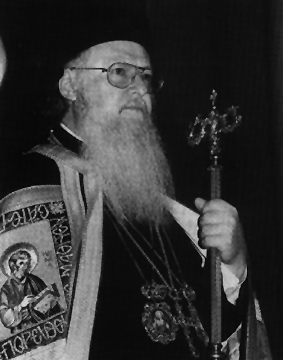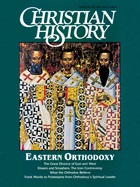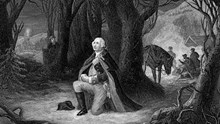
The bishop of Constantinople is also called the ecumenical patriarch and holds honorary primacy among the bishops of Orthodox churches. The current ecumenical patriarch, Bartholomew I, will make a pastoral visit to the United States this summer, marking the seventy-fifth anniversary of the founding of the Greek Archdiocese of North and South America. Christian History conducted a fax interview with Bartholomew I, the unedited transcript of which is reproduced here.
What is the purpose of your upcoming visit to the U.S.?
The occasion for our visit to the United States is the seventy-fifth anniversary of the founding, in 1922, of our Archdiocese of North and South America by the visionary Patriarch Meletios (Metaxakis). Patriarch Meletios, equipped with a first-hand understanding of the American milieu, undertook the task of organizing the canonical structure of the Church for the Greek Orthodox immigrants in the New World. In accordance with the tradition and canon law governing the Orthodox Church, he placed them under the spiritual jurisdiction of the Holy Mother and Great Church of Christ, the Ecumenical Patriarchate of Constantinople.
As to the nature of my prospective visit to the United States: it is clearly pastoral. The Ecumenical Patriarchate of Constantinople has both the privilege and responsibility of being the Protothronos, "the First Throne," of the Church. As such, it is a visible symbol of unity for Orthodox of every land and nation—and a source of unceasing intercession for them all. Therefore, it is self-evident that the coming visit will have a pan-Orthodox character.
One should remember that the Orthodox Church has never deviated from that consciousness and fundamental perspective of agape—love and unity. We are called to exercise the "ministry of reconciliation" (II Corinthians 5:18), and we look forward to a return of the holy churches of Christ to unity in him. At every divine liturgy, shortly before holy Communion, the Orthodox Church throughout the world prays for "the unity of all," that is, eschatologically speaking, the restoration of the unity of all mankind.
As Ecumenical Patriarch, we understand the broader meaning of this "ministry of reconciliation," and we actively pursue it by our pilgrimages around the world as we continue to reach out to all people, without regard to creed, color or ethnic origin.
To many Western Protestants, Orthodoxy feels dated, a quaint relic of a previous age. To others, it feels as if one has to become Eastern before becoming Orthodox. How do you respond to such perceptions?
You portray what is unfortunately an accurate picture, i.e., that the Protestant world (and not only it) is largely ignorant of Orthodoxy. Even theologians of great credibility have passed on rather demeaning misconceptions about Orthodoxy, as if it were a liturgical, or better yet, some ritualistic fossil. Unfortunately, such misconceptions, borne out of either ignorance or even polemical intentions, have been handed down unexamined for generations. Even the best efforts of the ecumenical movement, which aim at better understanding within the Christian family, have not succeeded completely at correcting this.
Another mistaken perception is contained in the very way you pose the question about the "East" and Orthodoxy. From an historical point of view, it is true that Orthodoxy has had an enormous impact on Eastern Europe and the Mediterranean basin. But let us not forget that Orthodoxy has had an historic and vibrant presence in the West since the middle of the eighteenth century, including the Greek colony in New Smyrna (modern day St. Augustine, Florida), the missions to Alaska, and the first parish founded in the continental United States in New Orleans (1864), which embraced Orthodox from every ethnic background.
Let us further remember that the Church is called not to identify Herself with civilizations and cultures but to transform them!
Can Orthodoxy become popular in the West? If so, how?
The mission of the Church is not to become "popular" but to preach the authentic Gospel of salvation and bear witness to the Resurrection of Christ. The work of Church is essentially prophetic and often far from being "people-pleasing."
The 2,000-year experience of the Church confirms that wherever the grace of God accomplishes her prophetic mission in truth and love, the Church gathers together the scattered children of God, and as a tender-hearted mother loves and, in return, is loved. We believe that is the case of Orthodoxy's witness and presence in the West.
Our Church is becoming "popular" precisely because she is the historical Church; she continues to preach the authentic gospel of salvation and bear witness to the Resurrection of Christ and has never tolerated nor accepted classes or categories within her fold. She is the Church of the people of God, coming from the people and ministering to the people in a "populist" way, rather than from "on high." In spirit, we are one family and one body of Christ.
Orthodoxy has experienced some of the most severe persecution in church history, both from Islam and Communism. How has that affected Orthodoxy, for good and for ill?
It is well known that the Church has been persecuted since the Day of Pentecost. The persecutors have been many, then and now. Christ has always been and continues to be "a sign of contradiction" (St. Luke 2:34), and with him, his Church. If there were no persecution, that would indeed be strange! We have always trodden the way of the Cross; there is no other path for the disciple of Christ. The Church's course through the ages has always been fraught with dangers and Her foundations are grounded in the sacrifice of men, women, and even children, whose very bones bear witness to the faith.
Recent times have seen a differing degrees of persecution from atheism, religious fanatics, and others, but we must not forget that the Church always emerges from these trials spiritually fortified and confirmed in the knowledge of her true path.
And we cannot help but acknowledge the pain caused by the acts of reprisal and inhumanity perpetrated by some Orthodox towards those who have wronged them. This only strengthens our resolve to pursue a dialogue of peace and reconciliation among our first responsibilities.
Orthodoxy is a small minority in the West. You would think that the various Orthodox bodies, especially in the U.S., would join together to present a unified Orthodox witness. Yet all around there seems to be suspicion, jealousy, and lack of trust among the Orthodox. What contributes to that?
Indeed, Orthodoxy is nearly an imperceptible minority in the West, and a consolidation of efforts would no doubt advance the witness of Orthodoxy in the West, to the benefit of the West. However, we must proceed cautiously in order to avoid the temptation to pursue any perceived worldly "power." Our aim is simply to strengthen the unity of the Church, to augment and edify the body of Christ.
To this end, the question of the Orthodox diaspora has been included in the agenda of the preparations for the eventual Holy and Great Synod of Orthodoxy. Along with these preparations, steps are being taken to overcome some obstacles from the past and promote a more substantial and visible unity. But the unity is essentially there, perhaps not always as visible to some because of the jurisdictional distinctions and ethnic and cultural pluralism.
What are the greatest challenges facing Orthodoxy today?
Orthodoxy shares the same challenges which all Christians and religions face: unbelief, secularism, decrease of spirituality, loss of hope. In particular, Orthodoxy faces the consequences of a long domination by atheistic regimes in lands which were by long held tradition Orthodox, and the resulting cultural discontinuity and spiritual vacuum.
Above all, Orthodoxy is confronted with the zeal of many Western Christians, especially from America, who, hastily attempting to fill that vacuum, are spiritually pilfering the house of their brethren. It would have been better for these zealots, their sponsors and supporters, to have spent some time studying Orthodoxy and to learn from real life experience, rather than only in theory, what it means to be a disciple of Christ and to witness the gospel in martyrdom.
We must never forget that the greatest persecution of Christians in history occurred in this century, hidden behind Iron and Islamic Fundamentalist Curtains, while the Western Christians lived in freedom and ignorance of the martyrdom of their brothers and sisters.
The Orthodox claim to constitute the only true Church. This claim, naturally, makes Catholics and Protestants balk. How should we understand this claim? What, according to the Orthodox, is our status before God?
We do not hold that exclusivity means judgment or exclusion. The idea that membership in a visible Church organization is requisite for membership in heaven is based on a false paradigm—that we somehow parallel the kingdom of God in this world. The kingdom is not an exterior reality, rather it is interior, at least until the end of time.
In identifying the Orthodox Church as the Church founded by the Lord Jesus Christ through His Holy Apostles, we by no means circumscribe or limit the kingdom of God. We know well the words of the Lord, that the Spirit blows where he will, and we acknowledge that the power, mercy and love of God are well beyond our comprehension.
While affirming that "He that is not with Me is against Me" (St. Luke 11:23), we also affirm that "He that is not against us is for us" (St. Luke 9:50). This historical antinomy is ever present in the life of the Church. But it nevertheless does not blur the definition of the faith, the canonical boundaries of the good order of the Church, or our desire to call all mankind to the knowledge of the truth. We prefer the spirit of genuine love and concern and avoid the kind of triumphalism that has caused so much alienation and division throughout the ages.
What is the most important message you will try to get across to Western Protestants when you visit the U.S.?
We are coming to America to bring a message of restoration and renewal through our blessed hope in the Risen Christ.
We are coming to America to speak the truth in love, for perfect love casts out fear and is the perfect path to unity in that same risen Christ.
We are coming to America to bring to our brothers and sisters in the Lord the lively faith that has been lived in the lands of the New Testament, indeed from where the New Testament itself was composed and compiled.
We are coming to America from with the same creed and confession forged in our own God-protected cities of Nicea and Constantinople that is a veritable synopsis of the Christian gospel that anyone can learn, live and through the living, inherit life everlasting.
We are coming to America because in America the faith that began at Jerusalem has spread out to the uttermost ends of the earth. Just as America began at Jamestown but received her constitution in Philadelphia, so does Constantinople complete the mystery inaugurated in Jerusalem.
We are coming to America bringing that same firm foundation, which has endured from the beginning, to share that which we have seen with our eyes, which we have heard with our ears and our very hands have touched: the mystery of God incarnate, alive forever in his people, his body, his Church.
Copyright © 1997 by the author or Christianity Today/Christian History magazine.
Click here for reprint information on Christian History.

Support Our Work
Subscribe to CT for less than $4.25/month




























